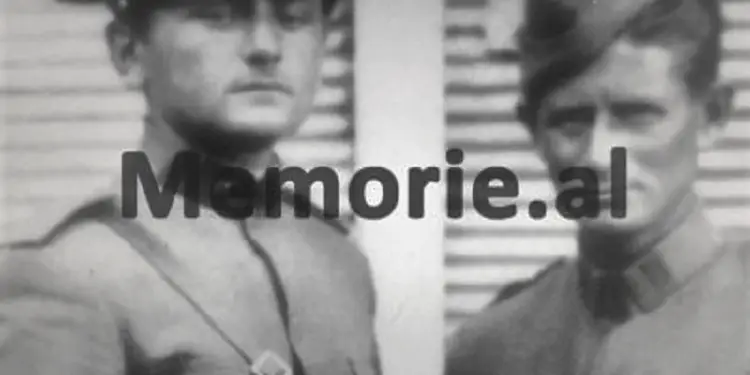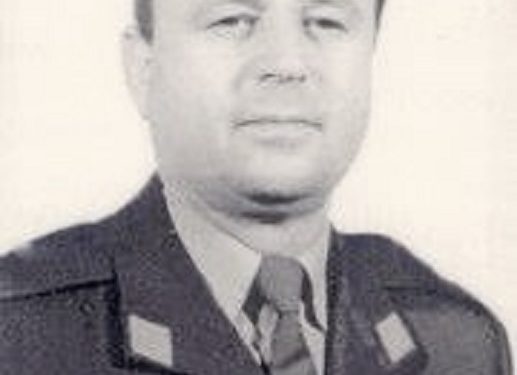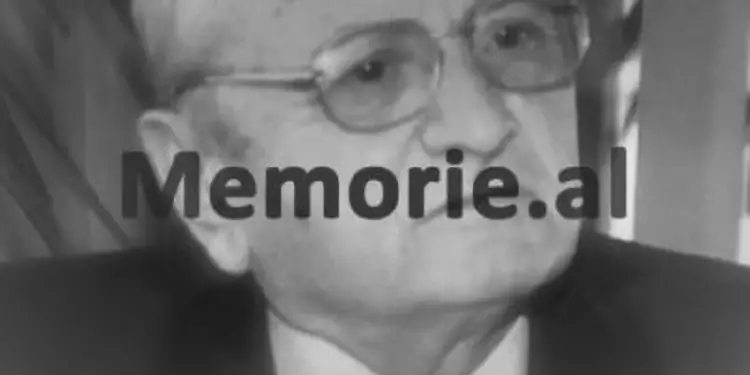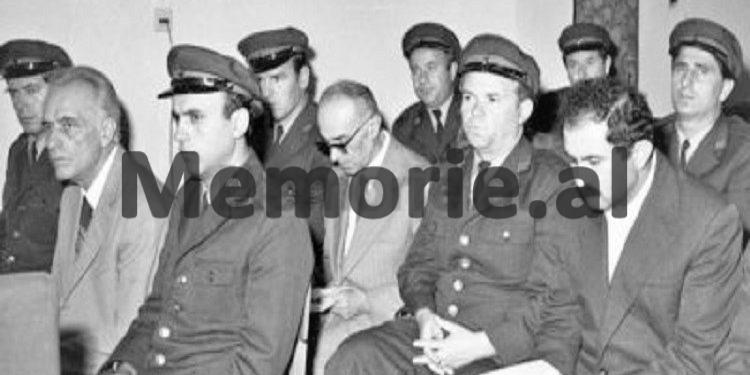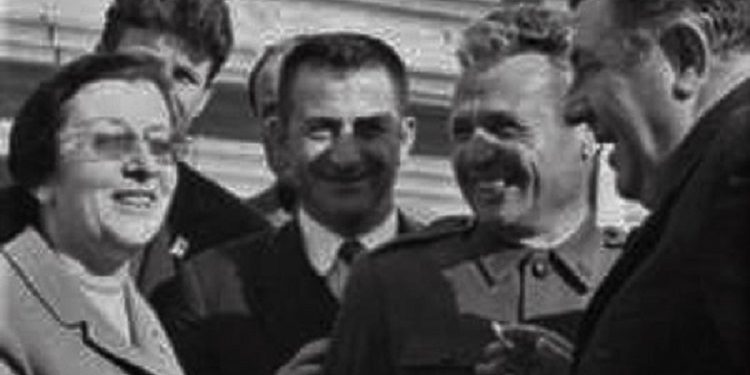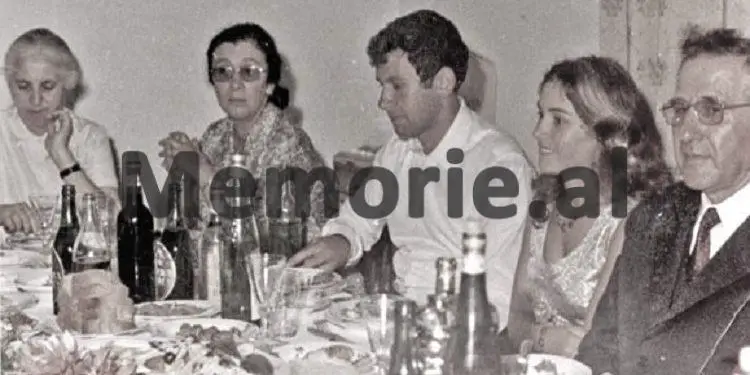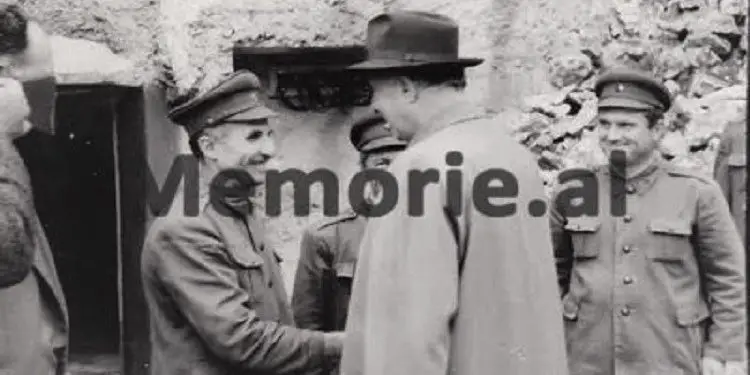From Kujtim Boriçi
The third part
Continues from last issue
Memorie.al / The desire to be in Tirana as soon as possible, to see the “Dinamo” football team and the well-known Haxhi Ballgjini, makes that in the harsh winter of 1980, dozens of reservists included in the 1st Brigade (following the known unit in the war), most employees of the Albanian Radio-Television, leave without completing the combat duty. One victim was also recorded from this massacre, which took place 100 km from Tirana. But in the face of such a situation, among the rarest in the units of the Albanian Army at that time, the death of a reservist, as if remaining in the “shadow”, in the face of the insistence of Enver and Mehmet, to find out the causes and punish the guilty.
“Biza-1980”, a serious and rare event for the army!
As stated in his memoirs by Veli Llakaj, the former chief of the General Staff of the Army, the first to be punished were some reservists, employees of the Television, where for two of them, it is proposed to remove the title of reservist officer and, for some others, of it is recommended to the institution to fire them. While the holders of the Tirana Group (commander, commissar, party secretary) and those of the Brigade, are dismissed from office. Veli Llakaj and Maliq Sadushi, the two deputy ministers, who are warned of dismissal from office, do not go unpunished.
At the same time, according to Llakaj’s notes, in the analysis of the defeat of the First Brigade during the march, made in the Defense Council, the clashes or criticism of Enver towards Mehmet, which in the practice of the time, did not happen to be shown in public, also come to the fore. .
The defeat of the First Brigade…!
“Together with some soldiers, on an anniversary of the liberation of the homeland, I remember that we visited Mehmet Shehu. We told him that our visit is not related to your being the prime minister of the country, but to the fact that you were the commander of the First Assault Brigade, created in Vithkuq of Korça, which made a great contribution to the liberation of Albania from the occupier. Mehmet was overjoyed, he waited for us as he knew how to wait, and in the end, in the form of an inner desire, he said to us: “Won’t you do training and March, on the road that the First Brigade did during the National War – liberating”!
We promised him yes. And indeed, this military unit, with a glorious past, whose commander I was also a few years before I became the Chief of the General Staff of the Army, has a history of important indicators, in readiness and defense, from generations of soldiers. So, it has done many trainings and marches, where the ability of the command, the troop headquarters stood out, but in one of them, the “Biza-80”, for reasons that I will list below, it did not complete the task. Somewhere between Okshtun of Dibra and Martanesh of Mat, some of its sub-departments were destroyed, and in fleeing to see a football match in Tirana as soon as possible, there was also a cost in human lives. This would bring numerous analyses, punishments for the leaders of the Brigade, but where I, as the Chief of the General Staff of the Army, and Malik Sadushi, as the Deputy Minister, who covered the training, would not escape.
What happened that wild winter?
The exercise of the 1st Brigade was planned as a reserve unit of the General Command and one of its tasks was in the direction of Stebleva, a border area with the former Yugoslavia, which was one of the important directions of an eventual enemy attack. in that direction. Therefore, this exercise was also planned in this region, but the march would be held, just as it was done the year after, so included in the exercise; “Shebenik 80”.
The movement of troops was; Tirana-Qafë Priskë-Fushë Bize, with the focus on Qafë e Pervalli. While the task of counterattack was in Zylit Mountain, in the direction of Kallkan Mountain, where the state border is. The weather was not bad, but it was made worse by the heavy snow that fell during the march. The measures that were taken predicted the successful completion of this exercise. Its management was done directly by the command of the Corps Headquarters and the direct participation of the commander, Bejto Isufi.
At the same time, for the preparation and successful crowning of this exercise, a number of personnel of the General Staff, respectively of the Operational and Training Directorate, were charged. In addition to the snow, the temperatures were extremely low, which required strong measures and, very carefully, that the soldiers did not freeze from the cold. The training area where the forces were concentrated had abundant timber, and it would not doomsday if they took it (and in fact they burned a quantity of wood stacked), for which there were also contestations from those who had prepared it. This quantity of burned grapes would then be paid by the army.
At the time of the attack, there were many defects, as some soldiers, especially the lazy ones, were hiding and did not come out of the places where they had lit fires, while some of them had dead legs and were swollen from the cold. This exercise was generally carried out, but of course, in these conditions, with shortcomings. After its completion, the order was given that the Brigade would return to where it came from, although there were proposals for it to return from Librazhdi by train. But for this, I opposed her, saying that she should return to Tirana, where the methodology was approved. Yes, according to the plan, on the way back, the Brigade had to rest in Biza, in very suitable camps of the Reconnaissance Detachment.
Many of the reservists were inclined not to rest, but to travel all night even in those extremely difficult conditions. The goal was that the next day, they would watch a football match, where Ballgjini, the famous former football player of “Dinamo”, was in his best form and there were many fans. Because of this, many of them became disconnected, lost their direction and became perverted. There was also a casualty, which had never happened in any unit and in any time, no matter how difficult it was.
Punishments
The brigade, with difficulty and somewhat irregularly, made the return march, which is reprehensible, such an act for the army. This was announced by the Minister of Defense, Mehmet Shehu. He informed the Central Committee of PPSh and Enver Hoxha. In this situation, he communicated the order to me the next day; the entire force of the Brigade was to gather in Yzberish. That’s how it happened. In these conclusions, Mehmet Shehu himself would speak, and we predicted the “storm”. After the Brigade was lined up, the Brigade Commander, Halim Abazi, presented the force to Minister Mehmet Shehu, who, after a short pause, said: “Grave silence, why don’t you speak?! Today, I will not speak to you as a minister, but as the commander of the First Brigade, during the Anti-Fascist National Liberation War”! Afterwards, he continued to talk not only about the war in Albania, but also about the war in Spain. As a first measure, in Mehmet’s presence, it was proposed that the three reserve officers be stripped of their officer titles and two people be checked by the job centers, to see if they should be in those jobs or not. It was mainly about those who worked in Radio-Television, as these employees made up a good part of the force of the First Brigade.
Enver Hoxha: “Why was the First Brigade destroyed”?!
The analysis and responsibilities did not end here. After a few days, the conclusions were made in the Defense Council, where, in addition to its members, the Deputy Ministers of Defense also participated. Enveri was very nervous and opened this meeting nervously, telling us: “We have called you in this meeting to report to us word by word, why this Brigade, which you have boasted about so much, has been destroyed, I also want to propose the corresponding measures”. I took the floor first, as chief of the General Staff, but also as a member of the Defense Council.
I read the material, of course noting the precautions we had taken regarding the deficiencies, as well as the measures that had to be taken, for their correction in the future. After me, the deputy minister, who covered the training, Comrade Maliq Sadushi, took the floor. He also started to read the discussion, but Enver Hoxha did not allow it. Nervous, he turned to him: “Hand over that material there and talk to us without a card.” As Maliqi tried to start, Enveri interrupted him again, saying: “Tell me why Bejto Isufi has requested that the First Brigade be completed from the village and not from the city!”. Maliqi answered him with some nervousness, saying: “I don’t know what Bejto Isufi said or what he has in his head”. Enver intervenes again and tells him: “He has the wrong opinion and has copied Beqir Balluk, in the theory of slippage; therefore he must immediately be demobilized from the army”!
The situation became tense. Mehmeti stands up and says: “Comrade Enver, Bejtua is a good, dedicated, hard-working commander, and I do not think that he has copied Beqir Balluk, therefore, leave this matter to us, to judge and leave it still in the Army, because there is still some time left, he will retire”. Enveri intervenes, against Mehmet and says: “You, comrade Mehmet, made a mistake that you spoke in the Brigade, not as a minister, but as the commander of the First Brigade of the war. This attitude and action is not right”! In the end, the Defense Council decided: The commander, commissar and secretary of the Tirana Group, to be dismissed from their duties, while the comrades; Veli Llakaj and Maliq Sadushi, receive a notice with a warning for dismissal from office. With that, this meeting and this story ended.
This is why I asked Mehmet to dismiss me as the Chief of the General Staff of the Army!
Mehmet, he didn’t make you a man! Professional skills, persistence at work, the demand for accountability for subordinates, were one side of the character of Mehmet Shehu, the number 2 of the Albanian state in the dictatorship, while his hot-temperedness, often to the extreme, strictness in communication on his part, made his subordinates to tremble when faced with it. Veli Llakaj, his closest collaborator in the Ministry of Defense, during the time that Mehmet led this department, among others, tells an interesting detail, where faced with Mehmet’s hot-tempered, harsh criticism to the extreme, he asks him to to sign the proposal for his dismissal from the Chief of Staff.
But Mehmet Shehu, who made everyone who faced him tremble, as Llakaj writes, was a man who sought and forgave. Also, according to Llakaj, the strict and nurse, Mehmet Shehu, was also a very benevolent, hospitable and loving man. The figure of Shehu, according to the author Llakaj, although it was complex, as a whole, he was a person equipped with all the qualities of a state leader. But that dictatorial state, which Mehmet Shehu himself, alongside Enver Hoxha, has the merit of building, would very soon force him to commit suicide.
A clash with Mehmet Shehu
In a collegium meeting, I had a fierce clash with Mehmet Shehu. The problem of discipline at the army level was discussed. A soldier had left the Puka corps without permission for several days. In the ongoing discussion, Mehmeti turns to me: “What about you, Chief of the General Staff, what responsibility do you hold and what measures do you propose to be taken for you”! I was surprised by this rush, but I carefully tell him: “I don’t feel any responsibility, because the soldier has a platoon, company, battalion, brigade, corps commander, the corresponding director, and finally, when they take all these measures, then my measure is coming”! I look at my friends, but even they, especially Maliqi, Llambi and Menduj, showed signs of concern…!
Mehmeti with that “savageness” of his addressed me: “I dismiss you to… to… etc!”. A debate ensued. At the height of his irritation, Mehmeti tells me: “Get out and leave”! I didn’t want to, but we couldn’t make a scandal. I left and went to the office. Of course, you’re upset. After the meeting, Maliqi and Llambi come to the office in turn. After them, Mehmeti comes to the office and tells me: “You were bored, but that’s how these jobs are. If I didn’t yell at you, who can I yell at, then we make a mistake because, helbete, we have nerves too, then loads, requests, blows and criticisms, etc.! I didn’t give myself up, but I told him: “I propose my departure, because I can no longer continue in this task, with these screams as if I were a kindergarten child”! And he went away upset. In the evening, around 10:00 p.m., he calls me and asks me about nothing…?!
A visit from Mehmet, to my family…!
The next day, he didn’t come to the ministry, but he didn’t answer the phone either. Later that day, around 7:00 p.m., Ali Çenua takes me on the phone and tells me to go home, that my friend Mehmet and his friend Fiqrete will come for a coffee Went. I received them exactly as a friend, but I also had my father there. When they met, they greeted each other very socially. He told the father that I, (Mehmeti), did not know that you were here. I came today, I offended Veliu and together with Fiqreti, we said to come to ask for forgiveness…! The father says to Mehmet: “Nothing, don’t feel sorry for them, but if you shoot these pigs with your palm, it’s good for them, because it’s for their good”! How painful this scar remained for me.
Mehmeti: “Who does not respect the language, does not love his people”!
When we were preparing the operational plan, I wrote about the state reserves, which had to be planned for the South, to be in Povel. The notes were handwritten, but I usually do it without a dot above, but only a dot, in the form of an apostrophe. He had read and approved that place, but after 2-3 days, he came to the ministry and, as usual, he kept those pieces of paper. He calls me to the office and says: “I don’t understand what you wrote here, I don’t understand where this place is”?! I was surprised, how is it possible that he does not know where Povëla is. I read it and said: “Here it is, in Povël.”Read it, read it! – He tells me. Then he asks me: “How many points do eh have?” “Two!” – I say, as if I were a student. “And you, why did you put one”? – He addresses me. I answer: “I, friend Mehmet, thank you for putting one on, because I don’t put them on at all”! Then Mehmeti takes the letter from me and writes: “He, who has no respect for the language, has no respect for the party, the people and the homeland. Mehmet Ismail Shehu”.
At the end, handing it to me, he says: “Take this, keep it until the grave”! So, he didn’t even forgive you in writing. How many such cases have we had with Mehmet Shehu, as his deputy? Often we, but mostly friend Llambi Gegpriti, as the youngest and the funniest, imitated Mehmet, with that “heavy” voice of his, when he gave us a task, or asked us to account for something we hadn’t done well. Llambi had done this stunt, that is, impersonating Mehmet on the phone, several times and we had taken it for real, that it was Mehmet, and we reported to him one by one. But this happened to us like Zylfo’s wolf. One day, Mehmet called me and he needed a wartime supply plan for the army, which was top secret. When he picked me up, I thought it was my friend Llambi and I said: “Go away, wait, don’t tear my head, why don’t I know you, who you are!”
It was Mehmeti; he got angry because he didn’t know this game we were playing with his name. Hang up on me. I call Llambi and tell him that he shouldn’t have made a joke like usual. Llambi tells me no, it was my friend Mehmet, who took me and asked me for a supply of clothing for the Army in wartime. After Llambi came to get the document that I took out from the archive of the General Staff, I tell him everything that happened and tell him that we will go together, where I would ask for his forgiveness. We went and told his secretary, Peçi Kalluç, that he had asked for us. Mehmet tells him to enter only Llambi, not Veliu. I talked to Llambi and we both decided to go in, but I went ahead. As soon as I entered, Mehmeti told me: “I wasn’t looking for you, but only Lamp!”
I had the document that Mehmeti was looking for, not Llambi. I say: “Comrade Mehmet, I came for two problems. First, I apologize and, secondly, this material is extremely secret and, according to the order, the right to release it belongs to the Chief of the General Staff”! Under these conditions he accepted us. Then I confess to him how the matter is, that I answered him on the phone like that. Mehmet didn’t like it and said to both of us: “Why, you are mocking me and slandering me”. Comrade Llambi took the floor, because I was embarrassed in this case. Llambi continued: “Comrade Mehmet, do you remember at the meeting of the leadership of the Council of Ministers, when we from the Ministry of Defense were also present, regarding the surveillance regulation and Comrade Pali Miska, reported to you about the corn cobs of Thumana, and you were upset and you spoke harshly to him”. “Yes!” Mehmet says. “Well, when I went to the office, I called my friend Pali and said: “Mr. Pali, how come you don’t have an iota of respect for dealing with the Kokeks and reporting to the Prime Minister”!
Mehmeti continued: “You have no respect for me because even now that we are talking, you are sitting…! Paul answered: “No, Comrade Mehmet, for the ideal of the party, that I stood up”! Mehmeti addresses Llambit: “But why did you even get here as Prime Minister, I’m so bad, I’m so afraid that I won’t eat you.” No, if that was the case, I would have eaten Fiqreti first”! Work started normally, but also laughing, Mehmeti wanted it, he didn’t want it, I ordered fruit and coffee. This was Mehmet’s temperament. How many episodes do we have with this man, me and other friends who worked with him for a long time?
Mehmet’s order: “The resistance of the fortification to be tested with living beings”
Although the most prepared military personnel of the country were charged with the task, according to the official documents of the Ministry of Defense, Mehmet Shehu, Prime Minister and Minister of Defense at the same time, was not only the main idea behind the “seeding” of the entire territory of the country with centers fire and concrete fortifications, but he was also the main leader of the practical implementation of this difficult task. The task given by Mehmet, from the beginning, was: “The whole country will become a palm and a center of fire, while the stability of every element of the fortification, for the safety of man, will be tested with living beings, sheltered in them, facing powerful artillery fire, as in a real war situation”!
“Fortification, this colossal and arduous work, according to the former chief of the General Staff of the Army, Veli Llakaj, was not something done and left in oblivion, or a fortification was made without knowing what resistance it might have, in a combat action. Therefore, he adds, some practical experiments were made with all types of calibers of our artillery, from direct firing cannons, from 85 m/m., to 152 m/m., for cannons and from 120, to 160 m /m., for mortars, as well as with aviation bombing strikes. According to the former Chief of Staff, successive experiments have shown that this fortification justified itself for the prepared purpose.
According to the drafters and leaders of the country’s fortified defense, experiments on the stability of fortification elements have been done several times in different places, in certain regions, with a group of fire centers, with all types of weapons and fire. After the first experiment, in the direction of the coast, the second experiment was done in the Mezhgoran Gorge. In all these experiments, says Llakaj, one of the protagonists of the fortification of the country, Mehmet Shehu, participated directly. The fortifications that were built, according to specialists, were diverse; above ground, underground and underwater.
Tests, animals in the center of fire, in front of artillery barrages!
The most powerful experiment to verify the stability of the fortification was the one that was done in Bajgaja of Delvina. The amount of fire that was set, was in one territory; platoon-company, i.e. an amount of 30-57, fire center. The amount of artillery that was placed in front of them, as a mouth of fire, was so great that it could hardly happen in a practical situation in real war. So, they were put so much that, even from the studies of the world military art of wars, done so far, it is hardly possible to make a comparison. In front of them, the artillerymen did not have any kind of precoupation, or emotion, that they might suffer a blow from the opponent, who find it more difficult to hit the fire centers directly.
In these fire centers, measures were taken and many living things were placed, such as; goats, cats, dogs, rabbits, etc. The artillery fire was maximum and direct, but the damage it caused was so little that you cannot calculate it. All that amount of steel, which was thrown from all calibers, only resulted in the death of a rabbit. In the experimentation of this fortification, many political, scientific and military personalities were present. This experimentation was led by Mehmet Shehu, while Hysni Kapo was also present. It took a full 15 days to complete this task.
Designers, engineers, constructors and their leaders have special merits in the design and quality realization of the country, such as; Think Backa, Alfred Moisiu, Abedin Galanxhi, Sul Domi, etc., says Veli Llakaj
In order to be an indicative training day in Saranda, says Llakaj, we left Tirana the day before, together with Llambi Gegprifti and Tahir Minxhozi. But for lunch, we returned to the Tepelena area, to my brother, Ramadani. He was waiting for us, because he had been notified the day before. The reception was like in the village, so meat and brandy.
Nurija, my sister-in-law, adds Llakaj, had killed two turkeys for us; not that we didn’t get one, but as per our customs, for the honor of two friends, that is, Llamb and Tahir. After we stayed for a while, the village lunch came, and the chat and brandy began. There it turned out that my brother, who had been a tractor driver in Peshkopi in 1954, had been known by Tahiri for a long time, and we became friends. The toast started as if from the village, although we were on the road. Moreover, when we went in the evening, Mehmeti and Hysniu, who had been there for three days, had also gone out hunting, they would call us and find out that we were drinking alcohol. Around 18.00, we arrived in Saranda and took places to sleep, since the road, but more so the brandy, had done their job…!
We said to have a coffee, but they informed us that they were looking for us, in the so-called House of the Party, where the comrades and leaders were. We were close to going, but we were drunk. Then Llambi made me an interesting proposal, not from himself, but from the brandy: “Veli tells me, how are we going to meet them, that we smell brandy, or try it once, blowing against each other”! So we did, how about dictating each other for drinks, when we were both the same. We went to the Guest House, but we didn’t get close. Comrade Hysni invites us to come closer because it was raining and to warm up a little. No matter where we approached, the smell of brandy came and we stayed away, awkwardly. The next day, Tahiri, as if jokingly, told his friend Hysni about this matter and it stayed with us as history.
Foreign soldiers for Albanian fortification
At that time, according to Llakaj, a modern, very active and irreplaceable fortification was made. According to him, no fewer than three such command posts of the Defense Council were built underground. Headquarters of the Council of Ministers, three headquarters of the General Staff, three others. All these were ready at any time, with all the necessary comforts for protection, living and work. All food and clothing reserves, necessary for coping with combat situations, were ready there at all times. The sleeping places were furnished with beds, mattresses, blankets, sheets, water taps, telephones, etc.
For this fortification, he adds, we are not talking (specialists and leaders of the time), but others have spoken, are speaking and will speak. Veli Llakaj, the country’s highest ex-soldier in the period 1974-1982, is among the first partisans of this defense. For this, he adds the statement of the Chief of Staff of the Turkish Army, during the visit to the Military-Naval Base of Shengjin and Gjadri (fortified): “Modern fortification, built with seriousness, contemporary, enlightened the mind and blessed the hands, to those who built it, protect it by law”! Memorie.al
The next issue follows




